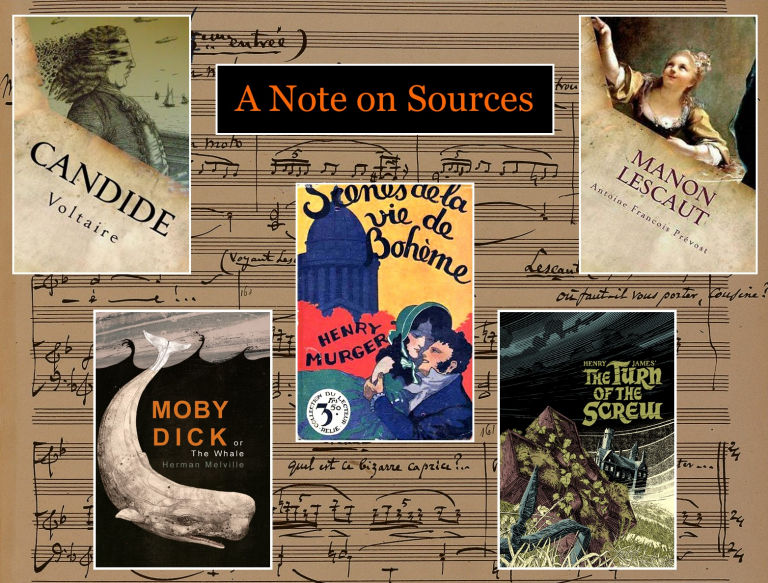

The following is a listing of the main operas that I shall be referencing in this course, together with the literary sources on which they are based. It is not necessary to have read any of these original texts, though I believe that some may wish to do so. If so, I would certainly suggest Roman Fever and The Turn of the Screw, since both operas will be heard complete and the sources are relatively short. Moby Dick will also be heard complete, but that is clearly a more daunting proposition. The other items are listed in descending order of the weight given to them in the course.
Almost all the books can also be obtained free of charge online; just Google (say) "Roman Fever text online". However, this reading experience may not be to everybody's taste. rb.
Purcell: Dido and Aeneas
Nahum Tate's libretto is based on Book IV of the Aeneid by Virgil, very considerably condensed.
I will hand out the complete libretto as part of the materials for this class, but for those wanting a
good translation of the original, I suggest the one by Allen Mandelbaum, available quite cheaply.
Ward: Roman Fever
The short story by Edith Wharton on which the opera is based is
available
for free as a PDF. I will also make it available as part of the materials for the class.
Britten: The Turn of the Screw
The Henry James novella is a little more than 100 pages in length. It is available in numerous editions,
either alone or with other works, and I don't think it matters which you choose. However, if you are
interested in background materials plus an overview of how the work has been interpreted over the past
century, look specifically for the compendium edited by Peter G. Beidler.
Heggie: Moby Dick
If you have not already read the huge Melville book, it may be too late to do so now, but there are
numerous editions out there. I myself enjoyed the Norton Critical Edition edited by Hershel Parker, for
the richness of its supporting materials and history of how it has been viewed over the past century
and a half. I also greatly enjoyed Why Read Moby-Dick? by Nathaniel Philbrick, a superb companion
that parallels the text in a series of short essays on topics that are always stimulating and often
surprising. And there is always the 1956 film by John Huston starring Gregory Peck, with script by Ray
Bradbury; it can be rented through Amazon.
Massenet: Manon and
Puccini: Manon Lescaut
Amazon lists two translations of Manon Lescaut by the Abbé Prévost. I find Leonard Tancock in the
Penguin edition marginally the more readable, but the Oxford World's Classics edition with translation by
Angela Scholar has the richer introduction, notes, and supporting materials.
Puccini/Leoncavallo: La Bohème
I read the Henry Murger Scènes de la vie de bohème in French, and find it hard to evaluate the
English translations, since Amazon lists two but gives samples of neither. My guess, however, is that the
one listed as Scenes from the Latin Quarter would be the more modern and more readable.
Bizet: Carmen and
Hammerstein: Carmen Jones
Most of the editions of Prosper Mérimée's Carmen listed on Amazon use the rather dated 1901
translation by Lady Mary Lloyd. So I would turn instead to the version by Nicholas Jotcham in the Oxford
World's Classics edition, which has the added advantage of the superb supporting materials of that series.
Adès: The Tempest and
Dean: Hamlet
Any good edition of Shakespeare.
Mozart: The Marriage of Figaro and
Rossini: The Barber of Seville
Both Beaumarchais plays (plus the third in the series) are included in the Oxford World's Classics
edition in an excellent translation by David Coward. It is listed as The Figaro Trilogy.
Verdi: La traviata
The situation here is a little confusing. The original novel by Alexandre Dumas is listed on
Amazon both as Camille and The Lady of the Camellias. Most seem to use the classic
translation by the novelist Edmond Gosse, but I would suggest instead the more modern version by Liesl
Schillinger in the handsome Penguin Classics edition. The only translation of the play that I
can find is The Camellia Lady in a rather slangy translation by Thomas Copeland. The play is
also listed on Amazon as an audio dramatization from the BBC.
Bernstein: Candide
Voltaire's Candide, or Optimism is very readable. I would recommend the Penguin Classics edition
with translation by Theo Cuffe. I should say, however, that our treatment of the book in the course
will be brief, and have more to do with the cleverness of its lyrics than their fidelity to
Voltaire's original.
Weiser: Where Angels Fear to Tread
My libretto is a fairly straight treatment of the novel by EM Forster, from Chapter 4 on. There are
numerous editions on Amazon. In our class, however, I shall only be mentioning one or two scenes, and
shall distribute the original texts on which these are based.